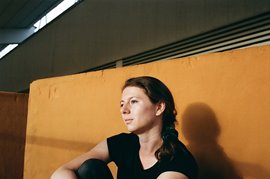Portraits - 3rd Prize
Niewybuch
Natalia Kepesz
22 October, 2020
Ola is a student at the Liceum Wojskowo-Policyjne, a military and police high school in Złotoryi, Poland.
Militaristic organizations for children, such as military schools, weekend clubs, and summer camps, are popular in Poland. Military summer camps for youth have existed in Poland since the 1920s. The young participants are put through boot camps, challenged physically and mentally, and given instruction—often on former army training grounds—in skills such as tactics, survival, self-defense, and topography. They are also taught to shoot, using air rifles and sometimes replica weaponry such as machine guns and grenade launchers. The camps are promoted as opportunities for adventure and recreation, and as character-building and encouraging team work. Organizers maintain that participating in games with replica weapons prevents children from seeking out real ones. On the other hand, there is criticism that suggests the popularity of the camps stems from the rise of nationalism in Poland, particularly since the coming into power of Law and Justice (PiS), a right-wing populist party. Patriotism and nationalism play a significant role in school education.

Natalia Kepesz
Natalia Kepesz is a polish photographer based in Berlin, Germany. After graduating in cultural studies and art history at the Humboldt University Berlin, she studied pho...
Through our education programs, the World Press Photo Foundation encourages diverse accounts of the world that present stories with different perspectives.
Our exhibitions showcase stories that make people stop, feel, think and act to a worldwide audience.
Our annual contest recognizes and rewards the best in photojournalism and documentary photography.
